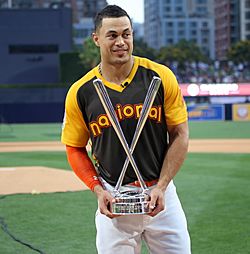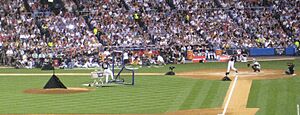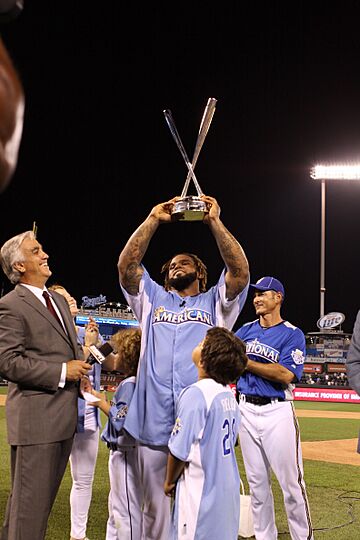Home Run Derby facts for kids

Giancarlo Stanton holds the trophy after winning the 2016 Home Run Derby.
|
|
| Frequency | Annual (every year) |
|---|---|
| Location | Varies (at the site of the MLB All-Star Game) |
| Started | 1985 |
| Most recent | July 14, 2025 (Truist Park, Cumberland, Georgia) |
| Next event | July 2026 (Citizens Bank Park, Philadelphia, Pennsylvania) |
| Current champion | Cal Raleigh |
| Current runner-up | Junior Caminero |
| Participants | Players from the American League and National League |
| Organized by | Major League Baseball |
The Home Run Derby is an exciting home run hitting contest held every year by Major League Baseball (MLB). It usually takes place the day before the MLB All-Star Game in July.
In this event, some of the best power hitters in baseball compete to see who can hit the most home runs. A home run is when a batter hits the baseball out of the park. Unlike a real game, there is no pitcher trying to strike them out. Instead, a coach throws easy pitches to hit.
The batters don't have to run the bases. They just stay at the plate and swing for the fences! In 2023, Julio Rodríguez set a record by hitting 41 home runs in a single round.
History of the Derby

The idea for the Home Run Derby came from a TV show in 1960 that had the same name. That show featured baseball legends like Hank Aaron, Mickey Mantle, and Willie Mays.
The first official MLB Home Run Derby was in 1985. At first, it wasn't even shown on TV. Now, it's a huge event broadcast on ESPN that millions of people watch.
The rules have changed a lot over the years. It started as a simple contest based on outs. Now, it's a fast-paced tournament with timed rounds and brackets.
Famous Moments
The Derby has had many unforgettable performances.
- In 2005, Bobby Abreu hit a then-record 41 home runs to win.
- In 2008, Josh Hamilton amazed everyone by hitting 28 homers in one round.
- In 2019, Vladimir Guerrero Jr. set a new record with 29 homers in the first round. He went on to hit a total of 91 home runs in the whole competition, which is the current record!
- Pete Alonso won back-to-back titles in 2019 and 2021.
- In 2023, Vladimir Guerrero Jr. won the Derby, making him and his father, Vladimir Guerrero Sr. (the 2007 winner), the only father-son duo to both win the event.
How the Derby Works
The format of the Home Run Derby has changed over time to make it more exciting. Here is a look at how it works now.
The Bracket Format
Since 2015, the Derby has used a single-elimination bracket. Eight players compete against each other one-on-one. The winner of each matchup moves on to the next round until only one champion is left.
The players are "seeded" based on how many home runs they have hit during the regular season. The player with the most homers (the #1 seed) faces the player with the fewest (#8 seed), and so on.
Timed Rounds
Instead of counting "outs" for any swing that isn't a home run, players now have a time limit.
- First and Second Rounds: Each batter gets three minutes to hit as many home runs as possible.
- Final Round: The time is shortened to two minutes.
- Timeouts: Batters can take one 45-second timeout in the first and second rounds, and two timeouts in the final round.
Bonus Time
Players can earn extra time by hitting long home runs. A batter gets an extra 30 seconds of "bonus time" if they hit at least two home runs that travel 440 feet or more.
Tiebreakers
If two players are tied at the end of a round, they have a one-minute swing-off. If they are still tied after that, they have three-swing swing-offs until a winner is decided.
Charity Donations
The Home Run Derby is also about giving back. For many years, special "gold balls" were used. For every home run hit with a gold ball, money was donated to charities like the Boys & Girls Clubs of America.
Since 2014, the sponsor T-Mobile has used special magenta-colored balls. When a player hits a home run with one of these balls, T-Mobile and MLB donate thousands of dollars to charity.
List of Winners

Here are all the champions of the Home Run Derby since it began in 1985.
|
|
Indicates there were two winners that year |
|---|---|
|
|
Member of the Baseball Hall of Fame |
|
|
Player was not chosen for that year's MLB All-Star Game |
Derby Records
Here are some of the most impressive records from the Home Run Derby.
Most Home Runs in One Round
| Rank | Player | Team | Year & Round | Total |
|---|---|---|---|---|
| 1 | Julio Rodríguez | Seattle Mariners | 2023 First Round | 41 |
| 2 | Vladimir Guerrero Jr. | Toronto Blue Jays | 2019 Second Round | 40 |
| 3 | Joc Pederson | Los Angeles Dodgers | 2019 Second Round | 39 |
| 4 | Pete Alonso | New York Mets | 2021 First Round | 35 |
| Randy Arozarena | Tampa Bay Rays | 2023 Second Round |
Most Home Runs in a Single Derby
| Rank | Player | Team | Year | Total |
|---|---|---|---|---|
| 1 | Vladimir Guerrero Jr. | Toronto Blue Jays | 2019 | 91 |
| 2 | Randy Arozarena | Tampa Bay Rays | 2023 | 82 |
| 3 | Julio Rodríguez | Seattle Mariners | 2022 | 81 |
| 4 | Pete Alonso | New York Mets | 2021 | 74 |
| 5 | Giancarlo Stanton | Miami Marlins | 2016 | 61 |
Most Career Home Runs in the Derby
| Rank | Player | Total |
|---|---|---|
| 1 | Pete Alonso | 207 |
| 2 | Vladimir Guerrero Jr. | 163 |
| 3 | Julio Rodríguez | 142 |
| 4 | Albert Pujols | 106 |
| 5 | Joc Pederson | 99 |
| Juan Soto |
See also
 In Spanish: Home Run Derby para niños
In Spanish: Home Run Derby para niños
- List of Major League Baseball All-Star Games
 | Calvin Brent |
 | Walter T. Bailey |
 | Martha Cassell Thompson |
 | Alberta Jeannette Cassell |

